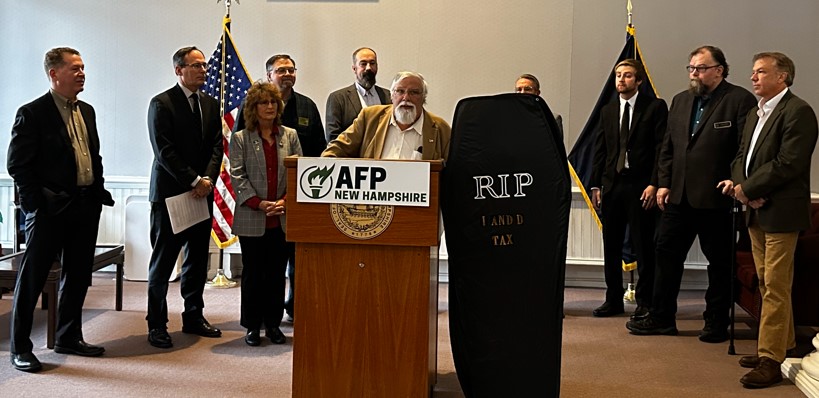By KATHARINE WEBSTER, InDepthNH.org
CONCORD – Republican House leaders, along with representatives of three anti-tax groups, held a “wake” Monday morning for the state Interest and Dividends Tax, which ends at midnight on Tuesday.
Yet the mood at the Legislative Office Building was anything but somber.
House Speaker Sherm Packard, R-Londonderry, said that as of Wednesday, Jan. 1, 2025, New Hampshire will become the only state besides Alaska with no taxes on personal income and no general sales tax.
Set Featured Media
“It was always difficult looking at national studies with graphics comparing the states on the basis of an income tax and seeing an asterisk next to New Hampshire, and New Hampshire being rated eighth because of our Interest and Dividend Tax,” he said, standing beside a dummy coffin that read “RIP I and D Tax.”
“On Wednesday, that ends.”
New Hampshire got to this point because of sound fiscal discipline and management – and with help from outgoing Republican Gov. Chris Sununu, Packard said. Republican majorities in the House and Senate expect to look at eliminating other taxes and trimming spending further under incoming Republican Gov. Kelly Ayotte, he said.
Democratic leaders were not amused. They said that the end of the tax, which was paid mostly by the state’s wealthiest individuals and households, would increase funding gaps in the next two-year state budget – even as that budget faces headwinds.
Those include payouts to people who, as juveniles, were sexually and physically abused at the state’s Sununu Youth Services Center; state Supreme Court rulings that could require the state to pay a much larger share of public education costs; the cost of building a new men’s prison; and declining revenue from interest on federal funds held by the state.
“Governor-elect Kelly Ayotte and state Republicans must be transparent for New Hampshire residents: What vital programs are they going to cut to balance the budget?” Senate Democratic Leader Rebecca Perkins Kwoka (Portsmouth) said in a joint statement with House Democratic Leader Alexis Simpson, D-Exeter.
Simpson and Perkins Kwoka said that eliminating the tax would shift more of the burden of funding state services onto local property taxpayers, “all to help the rich get richer.”
“New Hampshire already has the highest property taxes in the nation,” Simpson said. “While regular people struggle with rising costs in housing, child care, health care, groceries and basics, we should not be celebrating tax policies that only benefit the wealthiest.”
The Interest and Dividends Tax, which was established in 1923, taxed dividends, distributions and interest from certain investments at a rate of 5 percent from 1977 to 2022, with exemptions for interest and dividends earned by the most common retirement savings vehicles, including IRAs and other tax-deferred retirement plans, such as 401(k)s, as well as college savings plans and the interest on most federal bonds.
The first $2,400 in non-exempt interest and dividend income for individual taxpayers ($4,800 for couples filing jointly) and certain types of trusts and business entities, such as partnerships and limited liability corporations, was exempt from the tax, with an additional exemption of $1,200 for filers who were 65 or older, blind, or under 65 and unable to work because of a disability.
In 2021, the Republican majority in the state Legislature passed a phaseout of the tax as part of the two-year state budget, cutting the rate to 4 percent in calendar year 2023 and 3 percent in 2024. The state budget passed in 2023 accelerated the phaseout, ending the tax as of New Year’s Day 2025. When taxpayers file their 2024 taxes, it’s the last time they will have to pay the Interest and Dividends tax.
Most New Hampshire residents do not pay the tax, and the benefits of eliminating it go primarily to the wealthiest households, said Phil Sletten, research director for the New Hampshire Fiscal Policy Institute, a nonprofit economic research organization.
“Slightly more than 58 percent of all the benefits of interest and dividends tax elimination flow to the top 1 percent of households by (total) income,” Sletten wrote in informational testimony provided to the House Ways and Means Committee last January. “About 92 percent of the dollars that would have (gone to the state’s general fund) … stay with households in the top 20 percent.”
The New Hampshire Fiscal Policy Institute’s economists calculated that, based on annual interest and dividend earnings of 5 percent, anyone paying more than $500 a year in Interest and Dividends Tax had at least $248,000 in investments that were not exempt from the tax. An individual or household paying $100,000 or more in Interest and Dividends Tax would have had at least $40 million in non-exempt investments, they calculated.
MacKenzie Nicholson, senior director of MomsRising New Hampshire, said in a statement that mothers across the state are struggling to make ends meet, thanks to rising local property taxes and cuts to services.
“So it’s pretty frustrating and disheartening to hear lawmakers celebrating a tax cut for the ultra-wealthy, with their billionaire special interests patting them on the back, when they know that this handout to the rich is going to be paid for by the rest of us who are already feeling the squeeze,” Nicholson said. “It’s just not fair.”
But Greg Moore, state director of Americans for Prosperity, said at the “wake” that taxing wealthy investors is bad policy because they often contribute to the communities, nonprofits and business where they live. For example, he said, former state Rep. Will Smith, R-New Castle, who had been part of a group of “angel investors” that aided business start-ups in New Hampshire, moved to Florida, which has no income taxes, and took his money with him.
“When you have a tax that’s basically a conveyor belt to shove people out of the state, it’s never good for the state,” Moore said.
Andrew Cline, president of the Josiah Bartlett Institute for Public Policy, said that nearly three-quarters of those filing Interest and Dividend Tax returns paid $1,000 or less, including some who paid nothing. That demonstrates that the tax was hitting a lot of retirees and other investors, who are very aware of where their taxes might be lower and, once their investments reach a certain level, will have an incentive to move.
“This tax is dead in New Hampshire, and like all dead things it should stay dead, and not be resurrected to terrorize Granite Staters and lawmakers,” Cline said. “New Hampshire doesn’t need a reputation as a state where people are attacked by a zombie income tax.”
Despite the rate cuts over the last two fiscal years, Interest and Dividends Tax revenues were higher in fiscal 2024 (July 1, 2023 to June 30, 2024) than in fiscal 2023, thanks to the stock market’s strong performance and higher interest rates, according to the New Hampshire Department of Revenue Administration.
Total revenue from the Interest and Dividends Tax was $147.3 million during fiscal 2023 and $184.3 million in fiscal 2024, according to unaudited figures from the Department of Administrative Services, Sletten said Thursday.
Revenues from the tax can vary widely from year to year, based in part on stock market performance. But the fiscal 2024 revenues were more than the entire fiscal 2025 budgets of some significant state agencies and divisions, according to budget requests submitted in October.
For example, the fiscal 2025 budget currently authorizes: $177.3 million for the state Department of Corrections; $167 million for the Division of Children, Youth and Families; and $127.3 million for the state court system.
Packard declined to say exactly what the Legislature would target for budget cuts in the next two-year spending plan, which starts July 1, 2025, to make up for the loss of Interest and Dividend Tax revenues, but said the Republican majority would be closely examining everything.
In response to a question, however, Packard said that he did not think the fiscal 2023 and 2024 across-the-board pay raises for state employees of 10 percent and 2 percent, respectively, were too high, noting the state currently has around 2,000 vacancies in positions the Legislature funded.
“We needed to retain the employees that we had and fill those spots,” he said.
Cline, who is also president of the state Board of Education, said that when “our friends on the left” claim the state can’t afford to lose the revenues the tax provided, they should remember that it wasn’t money the state could count on anyway, especially with interest rates falling.
He also noted that state general fund and education fund revenues were more than $1 billion higher in fiscal 2024 than they were in fiscal 2014.
“New Hampshire does not have a revenue problem,” he said. “The problem is raising spending to meet revenues every time the revenues go up.”










